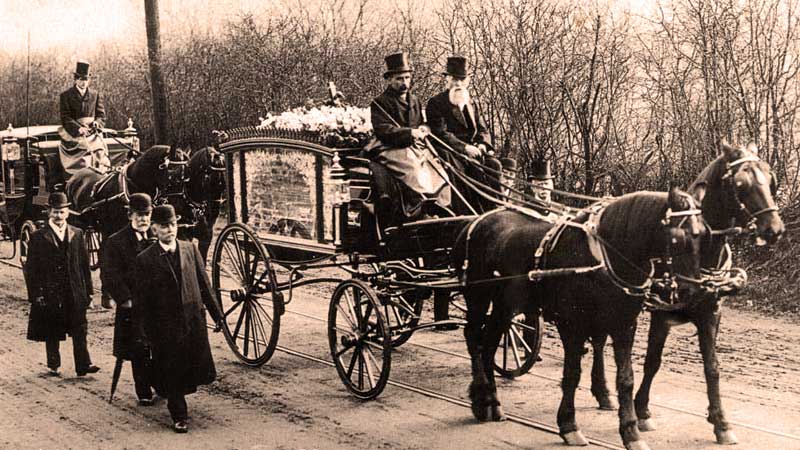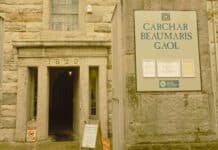The Welsh are renowned for their elaborate funerals, so writer CLAIRE BARRAND from Abergavenny dug deep into the dark and unearthed some of the more creepy beliefs and rituals surrounding death and burial, some of which continue today.

Death and pre-burial
Traditionally the room where a corpse lay before burial would be draped with white curtains and linen. Sweet-scented herbs were used to scent the room, and wax candles kept alight. The deceased would be washed and laid out on a table. Then the bowl containing the water used would be left under the table only to be discarded after the funeral. By the time this happened, it would have been several days old and foul.
It was tradition to cover up the mirrors and keep curtains closed. Before the 17th century the corpse would be wrapped in a shroud, but when coffins came into general use after this time, the Welsh would favour oak because they considered elm a poor alternative. A coffin would be made and brought to the house. Some parishes had a communal coffin which was retrieved after the funeral had taken place and the mourners left.
From the time of death, a corpse would not be left alone in the house, and a string of visitors would arrive. A wake was often held every night leading up to the funeral which, before the 19th Century, involved lots of alcohol and food; The bereaved family would have put on a meal of bread, cheese, wine or beer. The giving of beer was commonplace before tee-total Victorians frowned upon the custom and the tradition ceased.
It was also customary for gifts of butter, cake, tea, gingerbread, and sugar to be gifted to the family in mourning. Someone would be placed by the front door to receive such gifts and say “Diolch a cymerwch attoch.”
These would be respectful occasions, and from the mid to late 1900s the corpse would be propped up as the guests partook in various parlour games and post mortem photography was commonplace amongst those that could afford it. The corpse was dressed in their best clothes, and when placed into the coffin a white shroud draped over them.
The night before the funeral was called the ‘Gwylnos.’ Traditionally mourners would discuss the good nature of the deceased. They were expected to kneel by the coffin and say a prayer.
A Burial
On the morning of the burial, the mourners would arrive at the place of rest, where the main mourner would be sat dressed in a dark crepe with head held low.
In Aberystwyth, during the 1800s, if a burial was due to take place, it was customary for a man to walk around the town ringing a Corpse Bell. He would walk along and, every dozen steps he would stop and ring out one solemn stroke on his bell.
In the death parlour, before they left for the church yard a mulled wine would then be offered around, with a slice of funeral cake. All mourners would wear black gloves; close relatives wore silk gloves and more distant family members cotton. Lengths of crepe were also given out.
The Welsh have always carried their dead relatives to the churchyard, unlike the English who in general paid strangers to do this. They would be met at the gate by the clergy and led into the church to say prayers and sing hymns before lowering the body into the ground.
Before mourners left the graveside, it was expected to leave a silver coin as ‘spade money’ (arian y rhaw), on the gravedigger’s shovel for burying the dead.
In the 1700s it was the custom to throw a sprig of rosemary, which by the 19th Century, was substituted by the placing of flowers on top of the grave.
Superstitions and Omens of Death
There were a few superstitions surrounding death and funerals in Wales the most common being corpse candles.
According to tradition candles would be seen all along the route where the funeral procession was to take place. Often people would report seeing spectres of these candles moving slowly above the ground, and it was even said to be possible to see the image of the next doomed person in the light.
If a corpse candle was seen glowing red it was thought to be foretelling the death of a man; a white glow showed the death of a woman and a small, weak light a child. If two corpse candles were witnessed, they feared that two deaths would occur in the same family.
If the corpse candle appeared during early evening this was believed to sign post that the death would take place within a few days; if seen late-night then the death was thought to be predicted for some time in the next few months.
Omens of death were widely feared and taken very seriously indeed. In Port Talbot at the Morfa Colliery in 1890, workers noticed a strong scent of flowers. They believed this to be a sign of invisible death flowers and half the miners stayed in their homes. That day there was a huge explosion leaving 87 miners dead.
If certain types of birds flew over the pit head, such as pigeons, robins or doves, it was also believed to be foretelling a disaster. They were dubbed corpse birds and are reported to have been seen just before a humongous explosion at Senghennydd Colliery in Glamorgan during 1913 in which 400 miners got killed.
So seriously were these superstitions taken by Welsh miners, that if they passed a squinting woman on their way to the mine, they would turn back and go home to avoid bad luck. On the days that new lots for positions at the coal face were drawn, women at home would place fire tongs above the mantle piece and hid the cat in the (unlit) oven to try to protect their men from being selected!








Read your article and I found it very interesting, although I was born in England my heritage is Welsh and Irish decent, my mum was Welsh and she was very superstious , who told me about this supertion, in days gone past, but I think you find that not all these traditions , have died out pardon the pun, when my uncle , and my mum were buried , money was handed to the grave diggers , Diloch yn fawr Cymru am byth
Lovely writing. I enjoyed it, thanks.
Anyone with knowledge of funeral rites at Paddington for London Welsh bodies moved back home out there please?
Please e mail peter.jones74@btinternet.com
Hi, I was born in the Rhondda Valleys. When my grandmother died (early 90s) us women were told to go into a separate room with our eyes facing a wall so as not to witness her being removed from the home. Have you heard of this? I can’t find any mention of it on the web.
Thanks much!
Thanks for sharing that Julie!
The last traditional funeral in my village in Glamorgan was in the early 1970’s. All the men stood outside the house and sang hymns. The coffin was brought out feet first and through the window. This was to stop the ghost from finding the way back. Pnly men went to the church, where the emphasis was on the singing. As soon as the coffin went below the edge of the grave, the men left to go to the dead man’s favourite pub. Meanwhile the women went to the man’s house and helped to prepare food from when the men came back. I still find it strange to see women in the funeral service.